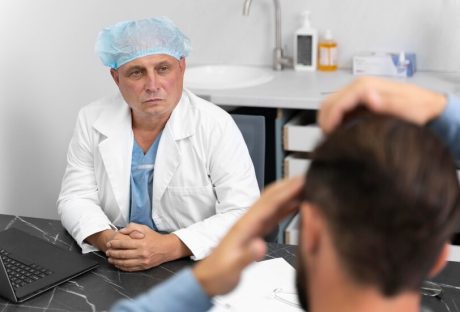A muscle injury of any type can be extremely painful, weaken the body, and make it difficult to proceed with your daily activities. Muscle injuries include a pulled muscle or muscle strain and can occur for various reasons. Speeding muscle recovery time is crucial to carrying on with your life without pain.
Muscle injuries can limit the muscle’s movement, not only in that muscle but in surrounding ones attached via tendons and aponeurosis. Arteries, veins, and nerves penetrate the epimysium (connective tissue sheath surrounding the muscle). When a muscle is damaged, nerve impulses are sent to the brain, signaling pain. Blood flow can be compromised in severe muscle damage, and blood loss into the surrounding tissue can cause a bruise or hematoma.
Skeletal muscles also need signals (impulses) from the nerve cell to contract the muscle fiber. When an injured muscle cuts off these nerve impulses, the muscle cannot perform. In bodybuilding, muscle injury is what builds stronger, larger muscles as new cells fill in the tears. However, extreme damage can lead to serious issues.
How Does A Muscle Injury Happen?
A muscle strain can occur in various ways, each causing a different set of problems. Fatigue will not result in the same pain and damage that extreme exercise can cause.
Any strain on a muscle can reduce motion and cause pain. Minor and moderate injuries are easily treated at home. However, more severe damage (diagnosed as grade 3), such as rotator cuff tears, Achilles ruptures, or hamstring ruptures, might require surgery.
Muscle injury can occur in three different areas: within the muscle, at the connection between the muscle and tendon (most frequent), or in the tendon that attaches the muscle to the bone.
Muscle strains and injuries can happen to anyone. While athletes are more likely to experience these injuries, the general population is also at risk. Acute strains can occur while walking if you lose your footing or slip, throw an item, lift something heavy, jump, run, or lift something improperly.
Muscle injuries include:
- Strains: these contraction-induced injuries occur most often when muscles work across multiple joints during rapid acceleration and deceleration more than the tensile forces the muscle fibers can withstand
- Contusions: caused by compressive force to the muscle, such as in contact sports collisions that lead to muscle damage with bleeding resulting in a bruise
- Lacerations: most often occur due to injuries, such as industrial or traumatic accidents that cut the muscle
Here are some of the most common causes of muscle injury:
Poor Conditioning
Engaging in physical activity when the muscles have not been adequately conditioned can increase the risk of injury.
Improper Exercises
Doing extreme, high-intensity exercises or those your body is not used to can cause exercise-induced muscle damage. The ensuing trauma can lead to inflammation, swelling, increased passive tension, decreased muscle strength, soreness, reduced range of motion, and problems with insulin sensitivity as the muscles are involved in glucose uptake.
Fatigue
Overexertion of the muscle can lead to muscle fatigue, weakening it and making it more susceptible to injury.
Improper Warmup
Working the muscles without preparing them through proper warmup exercises and stretches can cause muscle injury. Lack of flexibility can increase the risk of injury as the muscle fibers are tighter than they should be.
Overuse
Repetitive tasks can cause micro-trauma to the muscles. For example, someone on the computer all day doing repetitive movements with the keys or the mouse may experience muscle pain in the inner elbow or wrist.
Injury
Whether caused by sports or trauma, an injury can result in mild to severe damage to the muscle. Bruising is a sign of bleeding, and while minor bruises are not dangerous, some forms of hematomas can be life-threatening in the case of serious injuries, including when fractures or internal organ damage is present.
Poor Posture
Sitting or standing in the wrong position for a long time can strain the muscles. Muscle strains are more common in the neck, back, shoulders, and hamstrings.
What Can You Do For Muscle Injury?
The treatment you need depends on the severity of the muscle strain. Muscle injury is categorized into three grades as follows:
- Grade 1: mild damage to less than 5% of individual muscle fibers, causing minimal loss of motion and strength.
- Grade 2: more muscle fibers are affected with increased damage, yet no complete ruptures. The injury can cause significant loss of motion and strength and may take two to three months to heal.
- Grade 3: complete muscle or tendon rupture that may require surgery to reattach the damaged tissue.
The tips below can help you speed up recovery from a muscle injury:
Rest
Injured muscles need time to heal, and that means letting them rest. An injured muscle is more vulnerable to further damage, so avoid activities that can further increase the strain.
Sleep
Getting adequate sleep is crucial to muscle recovery, as that is the time when growth hormone and insulin growth factor 1 promote cellular regeneration and tissue repair. Anything less than 7 hours reduces recovery efforts inside the body.
Hydrate
Hydrated muscles heal better than dehydrated ones. Along with water, increasing intake of fruit and vegetables provides additional fluids along with crucial vitamins and minerals the body needs for muscle repair.
Compression
Compression wrapping of the affected area supports and reduces swelling in the injured area. Do not make the compress too tight, which can cut off circulation.
Elevate
Raising the injured muscle above heart level decreases blood flow to the area, helping to reduce swelling. The sooner you can do that, the better it is to speed healing.
Ice
Applying ice packs to an injured muscle immediately can help reduce swelling and pain. Focus on doing it for 15 minutes every hour for the first two to three days (longer if necessary).
HGH Therapy
It has been clinically proven that HGH not only boosts muscle development but also enhances muscle repair and recovery. Find out what is the HGH cost in the US and whether HGH therapy is right for you.
Manual Therapy
Physical therapy targets the damaged muscle to improve circulation, increase mobility, decrease swelling, reduce pain, and promote healing.
Heat
After icing for three days, apply heat a few times daily to restore blood circulation to the area for healing.
Pain Management
There are many ways to manage pain, including over-the-counter medications, prescription painkillers (which can lead to addiction if used long-term), supportive braces, and getting help from a pain management specialist, if needed.
Increase Protein Consumption
Muscles need protein, and eating more protein, along with taking collagen or whey powder supplements, provides the muscles with nutrients to speed the healing process.
Consume Tart Cherry Juice
Studies have shown some benefits of tart cherry juice for reducing inflammation, soreness, and damage to the muscles.
Switch To Low-Impact Exercise During Injury Recovery
Strength and flexibility exercises can help improve strength and range of motion while speeding muscle recovery. A physical therapist can help determine the appropriate exercises for your condition.
Surgery
Serious injuries may require surgical intervention to improve healing. Seek medical help for severe muscle injuries.
Platelet-Rich Plasma Injections
PRP injections may accelerate muscle tissue regeneration in the damaged area.
Conclusion
Muscle injuries can cause significant pain, bruising, swelling, decreased range of motion, and loss of strength. The pain can be sudden, sporadic, stabbing, achy, ongoing, or combined.
As the muscle heals, stem cells around the injured area regenerate new muscle fibers, and scar tissue forms around the area. Torn muscle tissue may never fully regenerate, making it susceptible to future muscle strains.
Trying the RICE method of rest, ice, compression, and elevation is always the best step to take immediately. A newer recommendation is the PEACE approach, which has you protect the area from further injury by reducing use, elevating to decrease swelling, avoiding anti-inflammatory treatments (ice and NSAIDs) to allow inflammation for healing, compressing the area with a bandage, and educating yourself about the recovery period.
Protecting the muscles from injury is crucial, and giving strained muscles time to heal can reduce the risk of further damage. Seek medical attention if the pain and weakness are ongoing or severe.
Read Also:
- Seeking a Healthy Career: 10 Tempting Medical Careers to Check Out
- 8 Awesome Health Benefits Of Dark Chocolate
- Different Types Of Blood Circulation Exercise























